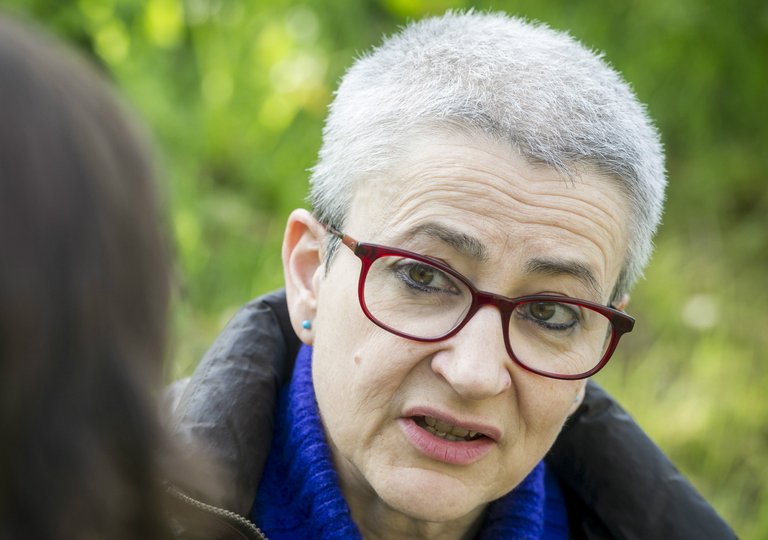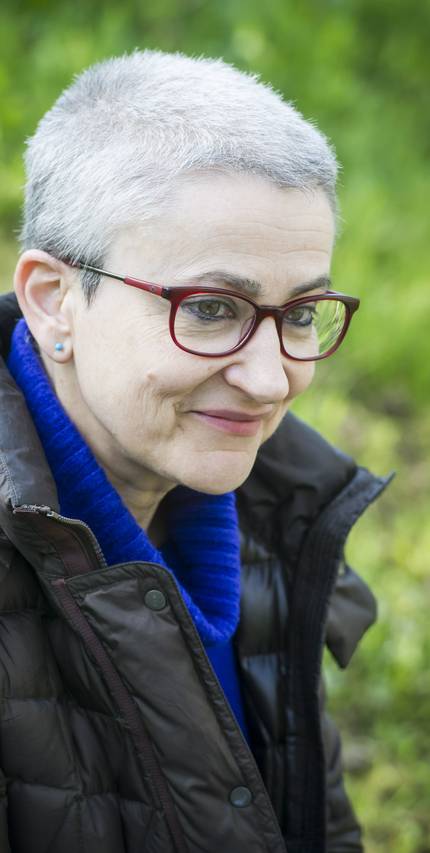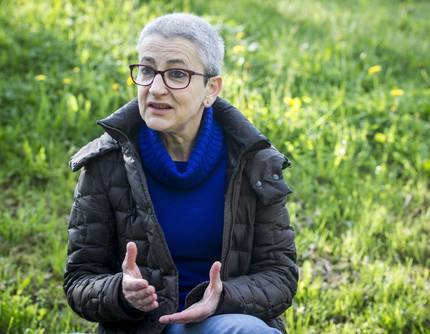“Society has greatly admired scientists and acted as children cared for”
Marta Macho is a mathematics specializing in geometric theory of foliations and non-commutative geometry. Beyond research, he is also editor of the digital space “Women with Science” of the Chair of Scientific Culture of the UPV. She has received several awards in recognition of her work of visibility of women scientists, including the Emakunde Prize for Equality in April. With Marta we wanted to clarify how women do science and whether the scientific system, as it is today, conditions the participation of women.

To start with, two questions: What have you had to give up for being a woman in science? And what have you renounced as a woman for being a scientist?
Well, I've probably renounced being a team boss, especially in science. I have often directed theses in collaboration with other scientists, but there has always been some time when the other director and I did not agree, the affection I have given so that there are no conflicts. And in those cases I have always had men on a par. Therefore, in the style of my students, the director man has influenced more than the woman.
And as a woman… it's hard to respond, because I don't have a partner, but I don't think it's for being scientific. Maybe I've had a life too fast in a few moments, yes. When you work in science there are very intense and special times that require giving body and soul.
What loses science by not integrating women to the same level as men?
He loses a different vision. I think women have a lot of creativity, but also a lot of insecurity. And when we work horizontally, or vertically, with men above, it is very difficult to establish our vision. Consequently, this vision is lost. There are few women leaders in science, many of them are only a photocopy of the leading men, probably because they have had to very well dip the way men do to get there.
In the previous one, a young woman who does her thesis in theoretical physics mentioned that when she works among men, in group, often her companions do not listen. It has a very sweet voice, and it's not that men want to silence, but as the debate begins to warm up, they don't even hear it. People laugh at it, they will think “that silly thing!” but since they don’t listen to it, they can decide to stay silent. And if you decide to shut up, the director may say: “As this does not speak, it has no ability to speak, so go to congress because it speaks of passion.” Science is very hierarchical and often come to congresses which stand out the most.
And what do women lose for not participating in science at the level of men?
They are losing a fascinating craft. Starting to work in science is hard. In these times when science has advanced so much, you are obliged to make new contributions, but when you find something new, science satisfies you very much.
They are also losing the opportunity to contribute to society, because we cannot forget that thanks to the contributions of science we have better health, we live longer years, we have better quality of life… And the internal satisfaction that feels when you say “I have contributed to progress” is being lost. You can not always be a secondary character.
It is difficult to get to science for women, but, once you arrive, do you notice the touch of women? Do we dare to do science differently?
I do not know, it is very difficult to go against the wind. When you're in a group, if you want to innovate, someone may slap you in the back and tell you: “Look, girl, leave the nonsense and start working!”
I think the difference is more in the way of working than in the way of doing science. In short, we have all drunk from male science. I do not have a different way of doing mathematics with respect to my male companions. But it is noticeable in the way of working. I, for example, work in a field of very masculinized mathematics, in geometry and topology. I did my thesis in France, where forms are also violent. People have to show themselves, stand out, and for that you have to raise your voice or ask a question to embarrass the other… Many times they are very aggressive ways.
The working environments of women are quieter and have more tendency to collaborate. You want the project to go ahead without having to reserve all the merit for you. In addition, things don't want to be done so quickly. In the current system, with so many problems of access to a job, things become too fast in science. You must publish it: publish it or die. And that means sometimes you have to do it so fast that it doesn't give time for things to make their way. I think a slower science, in that sense, would be more feminine. And it would be a science with less crushing due to that speed.
And do you join scientific women to jointly reflect in an organized or informal way?
It is very difficult. I speak in small groups. There are women who do not want to talk about this topic because it provokes anguish. They say they have never suffered discrimination. It is a form of self-protection to avoid the rejection of men. They do not want to see him, nothing more. That is why it is difficult to talk with other women about this issue.
If I were in your hands, what would you change in science?
Scientists often behave with pride. I believe that society has admired a lot and behave like spoiled children. “Scientists… those cold people who do such difficult things. They are so smart, so genius…” This stereotype of scientists influences a lot. Here labor relations are very difficult, since there are many people who consider themselves as something unique.
I would try to change the hierarchy to be more horizontal. Leave room for those who come from behind, listen to their ideas… If someone proposes something to you, instead of saying “that’s a nonsense,” listen. “To see, explain, convince me.” Let's be more open. Let us enjoy what we do, because we are privileged and leave room to those who come from behind.
It is important that among people with another profile. Do not always have the same profile on the head. And once, when you have candidates to join your group, apply positive discrimination, which alters people so much: in the same conditions, help those who are in a minority, in this case women. As long as we are not in the same situation, help us to the worst. The girl may not be left so in evidence and the boy seems more interesting to you. But the same is not so…
How did you decide to move from being critical with the situation to acting actively? What was the key moment?
The key is that someone who helps you in this step is close. I have been very conditioned to travel to Nicaragua to cooperate as a professor of mathematics. There I realized that women were very marginalized, although they were also teachers of mathematics. There I took a wonderful cheek. The point was to see very marginalized women and then reflect on what we have here.
I remember the first time I went to present my work in a congress, I was doing the thesis and I was 25 years old. You are afraid, because you have to present it to many experts. But you realize that they treat you of paternalism unlike boys, and that you don't like either. I remember one had to ask me a question and in the end he looked at me and said “bo, no!” as he said, “I will not ask him.” At that moment I felt a great rage because I thought: “What do you think I will not know to answer? I take root! Let me put my leg in and then go to the bathroom to cry if I need it.” Then I took a bath of reality.
Then, when I saw that I had another woman who would help me report the situation, I started doing it. That was the time when I joined the Commission of Women and Mathematics of the Royal Spanish Mathematical Society. When you find people with the same interests, it's about working networks.
How do you see the future within 25 years?
There has been a great setback in matters of equality and I think it is the result of a false illusion: “Women are already in science, now it’s a matter of time,” she said. But we have already begun to say that it is not a matter of time. I am optimistic. In congresses and scientific committees we no longer accept the absence of women, even if only to be politically correct. The presence and word taking in these places will help the women of the next generation to be more natural.
I hope that within 25 years there will be more women leaders and that there will be more girls wanting to do science, eager to find those things that are important for the advancement of society. Don't miss it!
Buletina
Bidali zure helbide elektronikoa eta jaso asteroko buletina zure sarrera-ontzian











